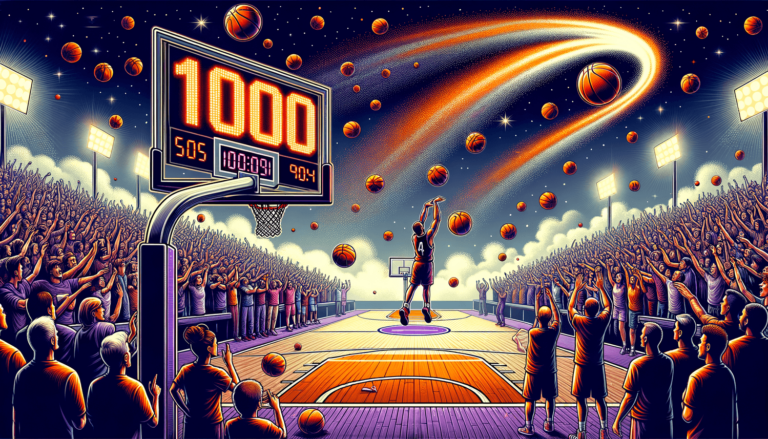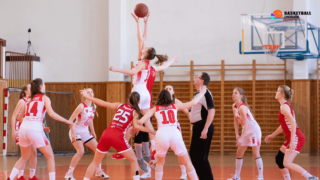
Anyone serious about basketball, specifically high school level, will inevitably come across the ever-buzzing question – ‘Is 1000 points in high school basketball good?’. For those new to basketball and its complex web of on-court achievements or even seasoned fanatics looking to satisfy their curiosity, you’ve dashed to the right spot! The vibrant world of high school basketball is full of stars, scoring milestones, and unforgettable victories, so let’s grab a seat on this virtual court side and explore whether or not that dazzling 1000-point benchmark is something to applaud about.
Is 1000 Points in High School Basketball Good?
Achieving 1000 points in high school basketball is considered a remarkable accomplishment. Reaching this scoring milestone typically signifies a high level of skill, talent, and consistency on the court. Most high school players strive to surpass the 1000-point threshold during their careers, which often leads to increased recognition from coaches, scouts, and colleges. However, while it’s undeniably impressive, it’s crucial to remember that individual achievements should complement a player’s overall contribution to their team’s success.
Understanding the 1000-Point Club
Before we dive into the significance of scoring 1000 points in high school basketball, let’s first gain a better understanding of the “1000-Point Club.” This is an exclusive, celebrated group of high school basketball players who’ve managed to achieve this compelling milestone during their high school careers. Once a player reaches 1000 points, they often receive recognition from their school, local newspapers, and sometimes even statewide attention.
A Glimpse of the Scoring Spectrum
To understand whether scoring 1000 points in high school is good, it helps to examine the broader context of scoring in high school basketball. Players can earn points in various ways, including two-pointers, three-pointers, and free throws. As a high school basketball career spans over four years, we can break down the 1000-point benchmark even further:
- 1000 points in 4 years: roughly 250 points per season
- Assuming 25 games per season: around 10 points per game
When viewed through this lens, the numbers might seem achievable but still require a consistent performance.
How Does It Compare to the Average High School Basketball Player?
To determine if 1000 points is good, it’s helpful to look at how it stacks up against the average high school basketball player’s performance. While scoring statistics can vary based on factors like region, division, and competition level, it’s widely accepted that the typical high school basketball player scores between 4 and 8 points per game. With this as a benchmark, the 10 points per game necessary to reach 1000 points in a four-year career is notably higher––indicating that a player has consistently performed above the average level.
Breaking Down the Significant Factors
Navigating the Varied Basketball Landscape
When assessing the impact of scoring 1000 points in high school basketball, it’s crucial to consider factors such as regional differences, competition levels, and each player’s unique circumstances. These factors can all contribute to the challenge faced in reaching this milestone. For instance, a high school basketball player competing in a small town or rural area may find it more accessible to reach 1000 points due to a lower overall level of competition. On the other hand, a player in a densely populated area with a strong basketball culture may face a more significant challenge in achieving the same milestone.
Roles and Responsibilities
Another aspect to consider when evaluating the significance of scoring 1000 points is the roles and responsibilities individual players have within their teams. Not all players are tasked with being top scorers. Some players might be more focused on rebounds, assists, or defensive duties. If such a player also manages to score 1000 points, it demonstrates that they are contributing effectively to their team’s success in multiple areas of the game.
Injury Considerations
Unfortunately, injuries are an unavoidable part of any sport, including basketball. Players who consistently score at a high level while overcoming injuries along the way are particularly commendable. Assessing the impact of injuries on a player’s ability to reach 1000 points can provide a more nuanced understanding of their overall achievement.
The Importance of Team Success
Reaching the 1000-point milestone is undeniably a significant individual achievement, but one mustn’t overlook the importance of team success. In the end, basketball is a team sport, and the aggregated efforts and synergy of all players contribute to a team’s victories. While scoring 1000 or more points during a high school basketball career is an impressive milestone, it’s crucial to consider how this accomplishment complements a player’s overall contribution to their team’s success.
Evaluating College Recruiting Potential
Prospective Player Evaluation
For high school basketball players with college aspirations, scoring 1000 or more points can signal strong potential to college coaches and scouts. In addition to evaluating statistics, college recruiters will also assess a player’s overall skill set, including their footwork, court vision, leadership, and defensive capabilities. While reaching the coveted 1000-point mark is not the sole determinant for college recruiters, it can be a positive indicator of a player’s skill and potential to succeed at the next level.
Maximizing College Basketball Opportunities
If you’re a high school basketball player with dreams of playing at the collegiate level, it’s essential to balance your focus on scoring with working on other aspects of your game. To capture the attention of college coaches and scouts, work on developing a well-rounded skill set that includes ball handling, rebounding, passing, and defense. Scoring 1000 points may be a significant achievement, but it’s equally important to show versatility on the court and contribute to your team’s overall success.
Fostering Personal Growth and Character Development
Often, the journey towards scoring 1000 points or achieving any significant milestone in high school basketball sparks personal growth and character development in players. Pursuing this goal often teaches invaluable life skills, such as resilience, perseverance, and dedication. The road to 1000 points is typically not smooth, and the challenges faced along the way often mold young athletes into strong characters with a growth mindset, preparing them for success both on and off the basketball court.
The 1000-Point Achievement in Context
To sum things up, scoring 1000 points in high school basketball is objectively a notable accomplishment, representing a level of skill, talent, and consistency that sets a player apart from their peers. While it’s important to celebrate this individual achievement, it should be weighed in harmony with overall team success, personal growth, and the player’s contribution to other aspects of the game. Ultimately, the road to 1000 points is but one fascinating journey in the exhilarating world of high school basketball.
1000-Point Scorers: Impact on the Team Dynamic
While achieving 1000 points in high school basketball is an admirable individual accomplishment, one must consider its impact on the team dynamic. A player who is actively pursuing this milestone must ensure that their focus on scoring doesn’t eclipse other essential aspects of the game, such as defense, passing, and teamwork. It’s important for teammates, coaches, and the player themselves to communicate effectively and work harmoniously towards both individual and team goals.
Managing Expectations and Pressure
With the quest for scoring 1000 points often comes high expectations and pressure, especially from family, friends, coaches, and even the players themselves. Managing this pressure is critical for a player’s mental well-being and long-term success. Approaching milestone achievements with a healthy mindset, focusing on personal development and growth, and leaning on a support system of mentors and loved ones can greatly assist high school players in navigating this challenge.
Success Stories: From High School to Professional Basketball
Many professional basketball players have roots in high school success stories, with numerous stars earning their spots in the 1000-Point Club. Their remarkable careers often serve as inspiration for young athletes pursuing their own milestones, showing that a strong high school foundation can pave the way for even greater accomplishments. A few examples of players who scored 1000+ points in high school and later found success in professional basketball include LeBron James, Michael Jordan, and Maya Moore.
Stretching Beyond the Milestone: Setting New Goals
Players who reach the 1000-point milestone may find themselves seeking new goals and aspirations to continue their basketball journey. Setting new benchmarks, both on and off the court, can help foster a lifelong love for the game and a growth mindset that extends into other areas of life. Whether it’s improving their free throw percentage, becoming a better leader, or obtaining a college athletic scholarship, ambitious high school players should continuously strive for growth and improvement.
Highlighting the Unsung Heroes
As we celebrate high school basketball players that reach the 1000-point mark, it’s essential not to overlook the unsung heroes in the sport. This includes players who might not achieve such high-scoring milestones but contribute significantly to their teams’ success in other ways. Whether it’s through staunch defense, exceptional leadership, or tireless support for teammates, these players deserve recognition for making a meaningful impact in the game we all love.
FAQ Section: 1000 Points in High School Basketball
Discover answers to the most frequently asked questions surrounding the 1000-point milestone in high school basketball, ranging from its significance to its impact on college recruitment and more.
1. Is scoring 1000 points in high school basketball considered good?
Yes, scoring 1000 points in a high school basketball career is generally viewed as an impressive accomplishment, showcasing a player’s skill, talent, and consistency on the court.
2. How many high school players achieve the 1000-point milestone?
While there is no exact statistic, scoring 1000 points in high school basketball is relatively rare, considering that it requires a higher level of performance than the average player typically achieves.
3. Does scoring 1000 points guarantee a college basketball scholarship?
Scoring 1000 points in high school basketball does not guarantee a college scholarship. College coaches consider various factors, such as overall skill set, athleticism, and potential, when recruiting players for their programs.
4. Should a player focus solely on scoring to reach the 1000-point milestone?
No, it’s important for players to maintain a well-rounded game, including defense, rebounds, and assists. A high point total should complement a player’s overall contribution to their team’s success.
5. How much time does a high school basketball player have to score 1000 points?
A high school basketball career typically lasts four years, which is the time a player has to achieve the 1000-point milestone.
6. What is the average points-per-game tally for a high school basketball player?
The average points per game for a high school basketball player typically ranges between 4 and 8 points, depending on factors like region, division, and competition level.
7. Can scoring 1000 points in high school basketball lead to professional basketball opportunities?
While some professional basketball players have scored 1000 points or more during their high school careers, there’s no direct correlation between high school scoring and professional opportunities. Each player’s path is unique, and various factors influence their potential for success at the professional level.
8. What are some common challenges high school players face in reaching the 1000-point milestone?
The journey to 1000 points often involves challenges such as managing pressure, coping with injuries, and balancing individual goals with team success.
9. How many games does a high school basketball player need to play to achieve 1000 points?
The number of games played may vary, but to score 1000 points in an average high school career, a player must score approximately 10 points per game over around 100 games.
10. Is achieving the 1000-point milestone more difficult in certain regions or divisions?
Yes, reaching 1000 points can be more challenging in certain regions or divisions where the overall level of competition is higher or other factors may affect play.
11. Are there other high school basketball scoring milestones besides the 1000-point club?
While the 1000-point milestone is a widely recognized accomplishment, players can set various other goals, such as improving their season averages or reaching smaller point milestones (e.g., 500 or 750 points).
12. How can a high school basketball player prepare to score 1000 points during their career?
Consistent practice, building a well-rounded skill set, setting realistic short- and long-term goals, and maintaining a healthy mindset can help a player work towards the 1000-point milestone.
13. Can a player’s position on the court impact their likelihood of reaching 1000 points?
Yes, a player’s position can influence their scoring potential. However, regardless of position, any player with a strong offensive game and consistent performance can strive for the 1000-point milestone.
Featured Posts
- No pillar pages found.





